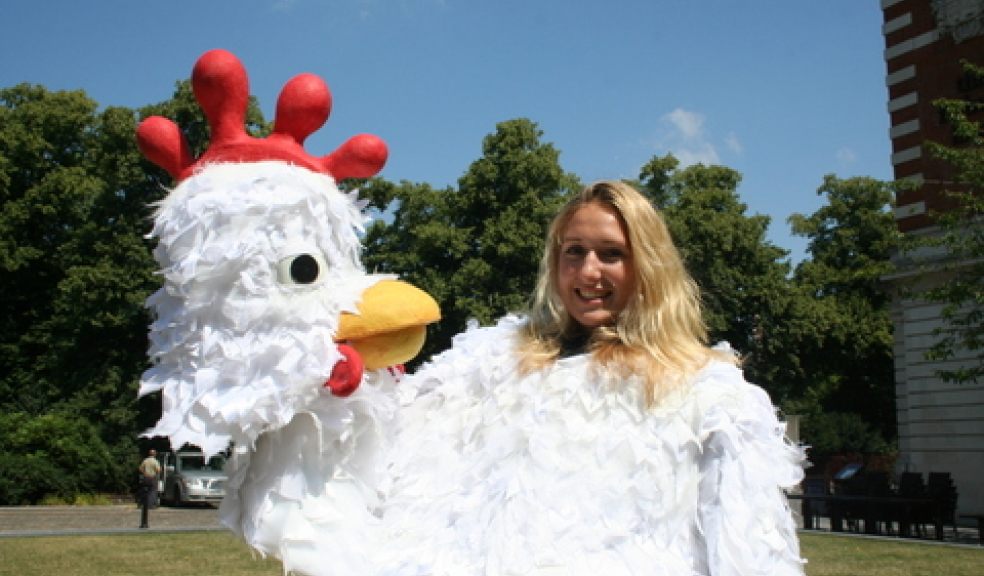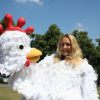
Giant Devon chicken takes on Europe
Devon broiler farmer Tamsin French has dresses s as a chicken called ‘Rosa’, and today embarked on a 39-day tour of the European Union. The 39Days4Rosa tour will take in 21 EU Member States and finish at the European Parliament in Brussels on September 8th.
‘Rosa’ is calling for clear, mandatory method of production labelling of poultrymeat. She wants consumers to be able to answer the simple question, 'How was this chicken kept?' Her tour can be followed on Twitter (@39Days4Rosa, #39Days4Rosa) and Facebook (39Days4Rosa).
Thirty-nine days is the average lifespan of an intensively farmed meat chicken. Around 90% of meat chickens reared in the EU are from intensive indoor systems. These chickens have little or no opportunity to display natural behaviours.
Ms French said “Our free range chickens live for fifty-six days, and from the moment they’re old enough to go outside they can range through tree covered, landscaped fields where they can express natural habitual behaviour. It’s important that consumers can accurately and easily identify the farm system used to rear their chickenmeat. The labelling term ‘free range’ accurately reflects the life of our free range chickens.”
The European Commission is reviewing poultrymeat labelling this summer – ‘Rosa’ wants them to deliver honest, mandatory labelling for European consumers. Research shows that Rosa’s mission is supported by most people in Europe. 1 Eight out of ten European Union consumers support mandatory method of production labelling of poultrymeat.
Ms French’s family farms in Devon and their 22,000 strong free-range broiler flock is RSPCA Freedom Food assured. They are part of a farmers’ co-operative, which supplies chickenmeat to superstores across the UK. She will be joined by two colleagues: Johanna Olsson, an Animal Science student from Berkshire, and Sam White, an animal welfare campaigner from Essex.
Ms French said: “Method of production labelling already exists for shell eggs. It means consumers can tell which farm system was used to produce the eggs they buy and has been an important factor in driving the dramatic increase in the number of cage-free egg-laying hens across Europe. 2
“The European Commission has recognised that mandatory labelling has also given producers the opportunity to differentiate on price and earn a better, fairer living. I want to see this type of labelling extended to chickenmeat – because clear, comparable, point of sale information is very important if higher welfare markets to grow.”
Many meat and dairy labels in the EU use confusing language and images that suggest animals are kept in extensive, spacious, ‘natural’ conditions even when the animals have been reared in standard intensive systems. Mandatory labelling will help ensure a level playing field for higher welfare producers.
In 2012, the European Commission promised consumers better information about farm animal welfare. Mandatory labelling of poultrymeat would deliver this, and requires just one simple rule change. 3














